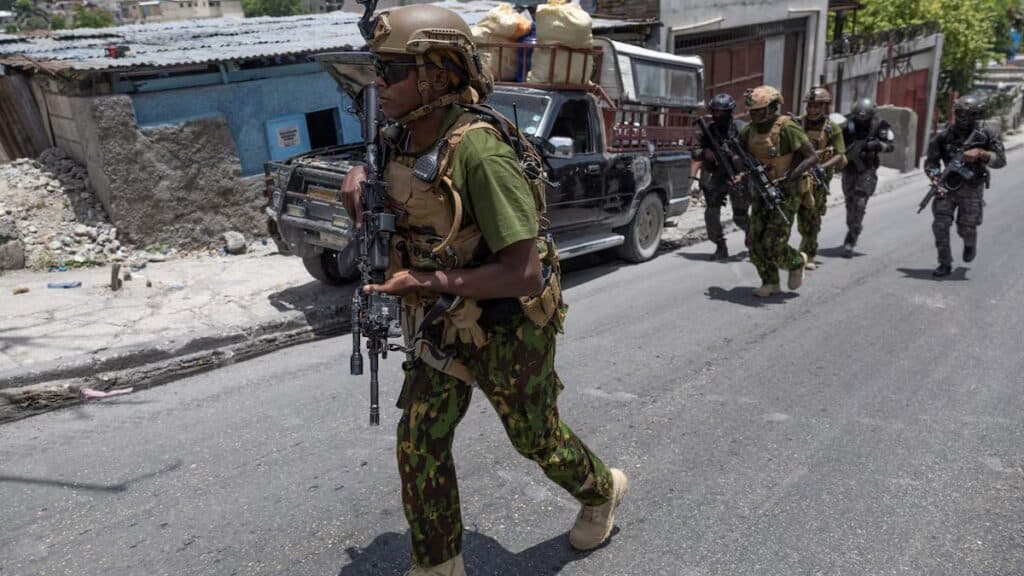We're loading the full news article for you. This includes the article content, images, author information, and related articles.
Hundreds of Kenyan police officers designated for a UN-backed security mission in Haiti face uncertainty following a recent UN vote, prompting calls for clarity on their deployment status and operational details.

Kenyan police officers earmarked for a multinational security support mission in Haiti are awaiting a definitive decision on their deployment following a recent United Nations vote. The vote, which has not yet been fully detailed, is expected to influence the immediate future of the mission and the officers involved. The Kenyan government has previously indicated its commitment to leading the UN-backed initiative, aimed at stabilising the volatile Caribbean nation.
The proposed deployment of Kenyan police to Haiti stems from a request by the Haitian government for international assistance to combat escalating gang violence and restore order. Kenya offered to lead the mission, pledging to send a contingent of 1,000 officers. This commitment has been a subject of extensive public debate and legal challenges within Kenya, with proponents highlighting the humanitarian imperative and critics raising concerns about the mission's legality, funding, and potential risks to Kenyan personnel.
The deployment requires a clear legal framework, both internationally through a UN Security Council resolution and domestically under Kenyan law. While the UN vote is a critical step, the specifics of its resolution will determine the mandate, scope, and duration of the mission. In Kenya, the National Assembly previously approved the deployment, but legal challenges have sought to block it, citing constitutional provisions on the deployment of Kenyan forces abroad. The government has maintained that the deployment is in line with international obligations and national security interests.
Analysts suggest that the UN's decision will significantly influence public discourse and policy execution in Kenya. Stakeholders, including civil society organisations, political leaders, and families of the deployed officers, are urging the Kenyan government to provide transparent information regarding timelines, operational costs, and safeguards for the officers. Concerns have been raised about the financial implications for Kenya and the preparedness of the officers for the complex security environment in Haiti. The government has adopted a 'whole-of-government approach' in preparation for the mission, indicating broad coordination across various ministries and agencies, ahead of the NYOTA program rollout, though details of this program remain scant.
The mission carries significant risks, including the volatile security situation in Haiti, the potential for casualties, and the logistical challenges of operating in a foreign environment. For Kenya, the deployment could enhance its international standing as a contributor to global peace and security, but it also poses financial burdens and potential domestic political ramifications if the mission encounters difficulties. The long-term implications for Kenya's foreign policy and its relationship with the international community will depend on the mission's success and the welfare of its officers.
Key uncertainties remain regarding the precise date of deployment, the specific operational mandate under the UN resolution, the detailed budget allocation for the mission, and the exact nature and scope of the 'NYOTA program' mentioned in government communications. The full implications of the UN vote on these aspects are yet to be clearly articulated by the Kenyan government.
Observers will be closely watching for official communication from the Kenyan government regarding the UN vote's outcome and its impact on the deployment. Further details on the 'NYOTA program' and its role in the mission's rollout are also anticipated. The welfare and preparedness of the Kenyan contingent, as well as the security situation in Haiti, will remain critical points of focus.
The deployment to Haiti is part of a broader trend of Kenya's increasing involvement in international peacekeeping and security operations, including missions in Somalia and other parts of Africa.
Keep the conversation in one place—threads here stay linked to the story and in the forums.
Sign in to start a discussion
Start a conversation about this story and keep it linked here.
Other hot threads
E-sports and Gaming Community in Kenya
Active 9 months ago
The Role of Technology in Modern Agriculture (AgriTech)
Active 9 months ago
Popular Recreational Activities Across Counties
Active 9 months ago
Investing in Youth Sports Development Programs
Active 9 months ago